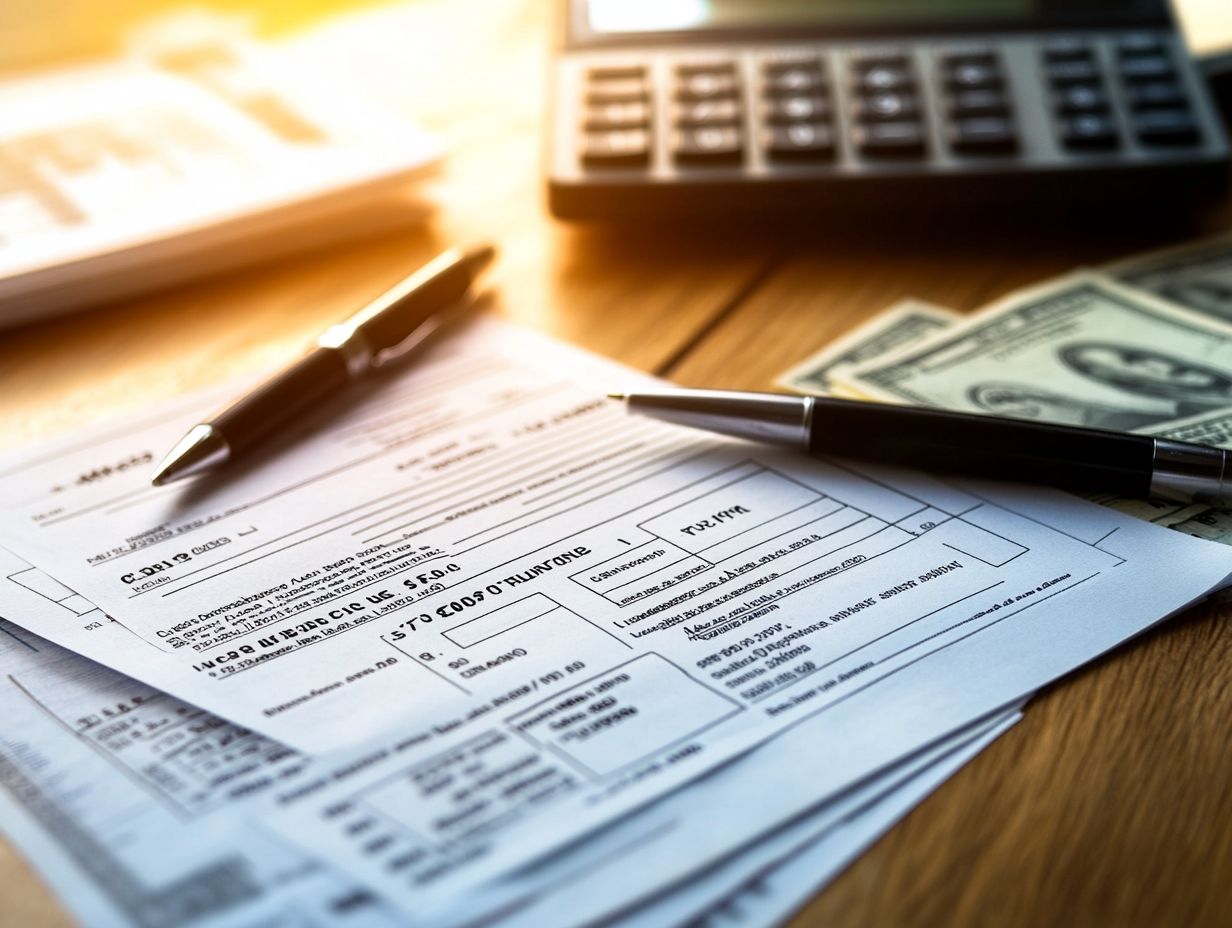Understanding 1099 Forms for Freelancers
Navigating the world of freelance income can indeed be a challenge, particularly when tax season rolls around. One essential element every freelancer must understand is the 1099 form.
In this article, you will discover what 1099 forms are, the different types available, and who should receive them. You ll find a comprehensive step-by-step guide on filing, along with common pitfalls to avoid and insights into how these forms affect your tax situation. By the end of this article, you ll be ready to tackle your freelance finances with confidence!
Contents
- Key Takeaways:
- What are 1099 Forms?
- Types of 1099 Forms
- Who Receives 1099 Forms?
- How to File 1099 Forms
- Common Mistakes to Avoid
- Tax Implications of 1099 Forms
- Frequently Asked Questions
- What is a 1099 form and why do freelancers need to understand it?
- Do all freelancers receive a 1099 form?
- What information is included on a 1099 form?
- How should freelancers use the information on their 1099 form for tax purposes?
- Are there different types of 1099 forms for different types of freelance work?
- What happens if a freelancer does not receive a 1099 form from a client?
Key Takeaways:
- Freelancers should understand what 1099 forms are and their purpose, as they play a crucial role in tax reporting.
- Different types of 1099 forms exist for various sources of income, so it is essential to know which one applies to your freelance work.
- Accurate and timely filing of 1099 forms is crucial to avoid mistakes and potential tax implications.

What are 1099 Forms?
The 1099 form is an important document for reporting various forms of non-employment income to the IRS. This is especially relevant for independent contractors and freelancers who receive payment for their services.
It’s essential to follow tax filing rules to ensure that your income is accurately reported on your tax return. Understanding the different types of 1099 forms is important for you as a taxpayer, enabling effective income reporting and helping you avoid potential penalties during audits. Additionally, understanding your tax rights as a freelancer can further protect you in the process.
Definition and Purpose
A 1099 form is a vital tax document issued by the IRS that reports various forms of income beyond the usual wages, salaries, or tips, which you ll find on a W-2 form.
These forms are crucial for ensuring you accurately report all income received throughout the year. Common types of income reported on 1099 forms include freelance earnings, interest payments, dividends, and rental income.
You’ll encounter several variations of the 1099 form, each tailored to specific reporting needs, like the 1099-MISC for miscellaneous income and the 1099-INT for interest income. It’s also helpful to familiarize yourself with freelancer tax tips for 1099 workers to ensure you’re fully prepared.
It s essential to adhere to IRS regulations when filling out and submitting these forms. Doing so helps maintain the integrity of your tax returns and avoids potential penalties. This responsibility not only protects you from the repercussions of inaccurate income reporting but also reinforces accountability and transparency in your financial dealings.
Types of 1099 Forms
You ll encounter several types of 1099 forms, each crafted to report distinct kinds of income. For instance, the 1099-NEC is the form specifically for reporting payments made to independent contractors for services rendered. The 1099-MISC covers miscellaneous income, while the 1099-INT pertains to interest income, among others.
Grasping the nuances of each form is essential for precise income reporting and maintaining compliance with IRS regulations.
Overview of Different Forms for Different Income Sources
The various types of 1099 forms cater to a range of income sources. For example, the 1099-DIV is for reporting dividend income from your investments. Don t overlook the 1099-MISC, which is frequently issued for miscellaneous income that doesn t fit into the typical wage category think prizes, awards, or even rent payments.
Then there’s the 1099-INT, covering interest income from banks and financial institutions. You might receive a 1099-MISC if you win a lottery or get a cash prize, while banks typically send out a 1099-INT at the end of the year to summarize the interest earned on your savings accounts. For freelancers, understanding tax returns is crucial, so be sure to check out this guide on tax returns.
Understanding the implications of each form is vital for accurate tax filing, as the income reported directly influences your tax obligations. Therefore, keeping meticulous records of all your income sources throughout the year is essential to ensure that no discrepancies arise come filing season.
Who Receives 1099 Forms?

As an independent contractor or freelancer receiving payments for your services, you must report this income to stay on top of your taxes! Expect to receive 1099 forms from your payers at the end of the tax year.
The process of issuing 1099 forms is essential for ensuring that all your income is accurately reported to the IRS. It helps you maintain compliance and avoid potential pitfalls down the line.
Criteria for Receiving a 1099 Form
To receive a 1099 form, you typically need to be classified as an independent contractor or freelancer. You must have received payments totaling $600 or more during the tax year from a single payer, as outlined by IRS regulations.
There are specific nuances that determine the type of 1099 form issued, depending on the nature of your relationship and the payments involved. For example, the 1099-MISC is often used for miscellaneous income like rent or royalties, while the 1099-NEC is specifically for non-employee compensation. Freelancers should also be aware of the understanding 1099-K forms that may apply to their earnings.
Payments in a business relationship have different reporting requirements. Clear classification is important. The IRS imposes substantial penalties for misreporting or failing to file, which can significantly impact your financial standing.
How to File 1099 Forms
Filing 1099 forms requires you to accurately report the necessary information to the IRS. You can choose between e-filing or paper filing. However, it s often wise to enlist the help of a tax professional to make sure you follow the rules and minimize any potential errors, especially for complex cases involving bookkeeping.
Keep your documents organized to avoid penalties! Proper document management during this process is essential.
Step-by-Step Guide to Filing
To file a 1099 form, start by gathering all essential documents that verify your income and payments received. Then, decide whether to e-file or go the traditional paper route for submitting the form to the IRS before the looming deadline this is your ticket to compliance!
Collect documents like bank statements, payment receipts, and contractor invoices. They will prove invaluable in accurately reporting your earnings. Next, determine which type of 1099 form best suits your needs. For a comprehensive overview, refer to understanding tax forms for freelancers, which covers several versions tailored to different payment scenarios, such as the 1099-MISC for miscellaneous income or the 1099-NEC for non-employee compensation.
Once you’ve identified the correct form, you can proceed with filing. If you choose e-filing, ensure your software is up-to-date; if you prefer paper filing, double-check that the forms are legible and accurately completed. Timeliness is key don t miss your deadlines; mark them on your calendar!
Be mindful of common pitfalls like clerical errors or inadvertently overlooking income categories, which can complicate the process. However, thorough preparation and meticulous attention to detail will help you navigate this task with ease.
Common Mistakes to Avoid
When you file 1099 forms, be mindful of several common pitfalls that can lead to errors in your submissions.
Incorrect income details, misspelled names, and filing late can all trigger penalties and compliance issues with the IRS. Taking the time to ensure accuracy can save you from unnecessary headaches down the line.
Tips for Accurate and Timely Filing

To ensure you file your 1099 forms accurately and on time, consider adopting efficient document management practices and consulting a tax professional. This strategic approach will help you navigate compliance requirements and steer clear of any potential penalties.
By keeping your records organized throughout the year, you can simplify the filing process when deadlines loom. Utilizing tax preparation software can streamline data entry and help you track payments made to contractors and freelancers effortlessly.
Seeking professional advice clarifies complex tax obligations and reveals potential deductions that might otherwise slip through the cracks. Being proactive in your filing process minimizes last-minute stress, reduces the likelihood of errors, and ultimately creates a smoother experience that ensures compliance with regulations while fostering a positive relationship with the IRS.
Tax Implications of 1099 Forms
Understanding the tax implications of 1099 forms is crucial! These forms often require you to pay self-employment tax, a tax that freelancers must pay on their earnings, and can affect how you report your income on your tax returns. This ultimately shapes your overall tax liability and your approach to financial planning.
It s essential to understand these nuances to navigate your financial responsibilities effectively.
How 1099 Forms Affect Your Taxes
Receiving a 1099 form generally signals that the income reported is subject to self-employment tax, which significantly influences how you calculate your overall income tax liability. It s crucial to accurately report all income received.
This form plays a pivotal role in determining your taxable income. Neglecting to report funds detailed in the 1099 can lead to substantial discrepancies when it’s time to file your taxes. Every dollar earned must be accounted for, highlighting the importance of diligent record-keeping throughout the year. For freelancers, understanding taxable income is crucial for accurate reporting.
A simple oversight in reporting can trigger audits from the IRS, resulting in penalties that could far surpass the unreported amount. Therefore, grasping the implications of 1099 forms aids in more precise tax calculations and helps you sidestep the stress and financial fallout of potential audits.
Frequently Asked Questions
What is a 1099 form and why do freelancers need to understand it?
A 1099 form is a tax form used by businesses to report payments made to a non-employee, such as a freelancer, for services rendered. It is important for freelancers to understand this form because it reports their income to the IRS and can impact their tax liability.
Do all freelancers receive a 1099 form?

No, only freelancers who have earned at least $600 in a tax year from a single client will receive a 1099 form. However, even if you do not receive one, you are still required to report all income earned from freelancing on your tax return.
What information is included on a 1099 form?
A 1099 form includes the freelancer’s name, address, and Social Security number or Taxpayer Identification Number, along with the total amount of payments made to them by the client during the tax year.
How should freelancers use the information on their 1099 form for tax purposes?
Freelancers should use the information on their 1099 form to accurately report their income on their tax return. They should also keep the form for their records and use it to fill out any necessary tax forms, such as Schedule C.
Are there different types of 1099 forms for different types of freelance work?
Yes, there are different types of 1099 forms for various freelance work. For instance, a 1099-MISC is used for most freelance work, while a 1099-K is for freelancers who receive payments through credit or debit card transactions.
What happens if a freelancer does not receive a 1099 form from a client?
If a freelancer does not receive a 1099 form from a client, they should still report all income earned from that client on their tax return. In certain cases, the client may have failed to send a 1099 form, or there may have been an error in the mailing. It is the freelancer’s responsibility to accurately report all income on their tax return.






